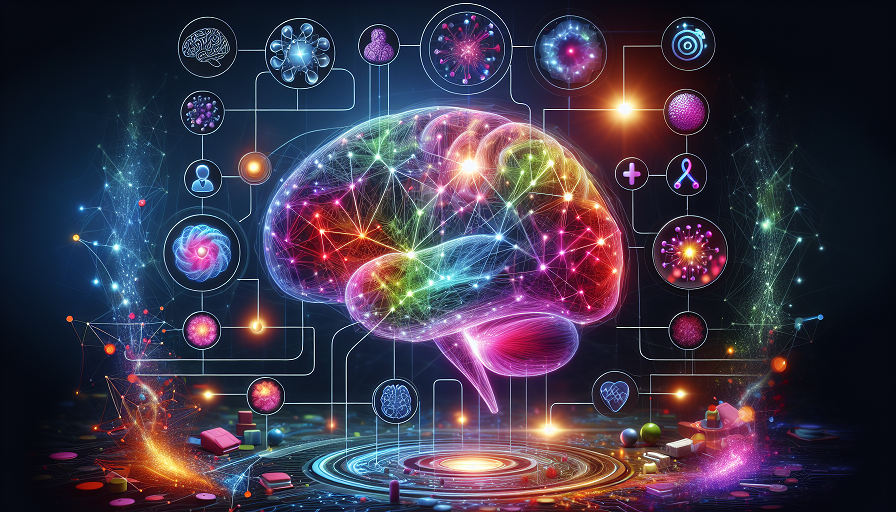
Happiness might seem like an elusive emotion, but science tells us it’s rooted in the brain and influenced by specific, actionable factors. From the foods we eat to the way we move, natural strategies can significantly improve our mood and enhance our well-being. Here we look at the science of happiness and provides practical, research-backed ways to cultivate joy and positivity—no synthetic shortcuts required.
Contents
Understanding the Brain’s Role in Happiness
Happiness isn’t just a fleeting feeling; it’s a complex state influenced by brain chemistry. Key neurotransmitters and regions of the brain work together to create and regulate your mood.
The Happy Chemicals
The “big four” neurotransmitters—dopamine, serotonin, endorphins, and oxytocin—play essential roles in your mood. Dopamine drives motivation and rewards, serotonin stabilizes mood, endorphins reduce pain and enhance pleasure, and oxytocin fosters connection and trust.
The Role of the Prefrontal Cortex
The prefrontal cortex, responsible for decision-making and emotional regulation, helps you process happiness. Activities that challenge this region, such as meditation or problem-solving, often enhance emotional well-being.
Supporting Brain Health
A healthy brain is key to maintaining a positive mood. Supporting cognitive health with nootropics like Rhodiola Rosea or ashwagandha can optimize neurotransmitter function, helping you stay balanced and joyful.
Eating Your Way to Happiness
The connection between diet and mood is undeniable. What you eat directly impacts your brain’s ability to produce mood-regulating chemicals.
Foods That Boost Serotonin
Serotonin is synthesized from tryptophan, an amino acid found in foods like turkey, eggs, nuts, and seeds. Pairing these with complex carbohydrates (like whole grains) helps tryptophan cross the blood-brain barrier more effectively.
The Gut-Brain Connection
Your gut microbiome plays a significant role in mood regulation. Fermented foods like yogurt, kimchi, and sauerkraut support healthy gut bacteria, which in turn promote serotonin production.
Practical Tip
Incorporate omega-3-rich foods like salmon, flaxseeds, and walnuts into your diet. Omega-3 fatty acids support brain health, reducing symptoms of depression and anxiety.
Exercise: Nature’s Antidepressant
Physical activity is one of the most effective natural mood boosters. The benefits go far beyond burning calories—it’s about what exercise does for your brain.
The Endorphin Effect
Exercise releases endorphins, your body’s natural painkillers and mood enhancers. Activities like running, cycling, or dancing create what’s often referred to as a “runner’s high.”
Reducing Cortisol Levels
Stress produces cortisol, a hormone that can dampen your mood over time. Regular exercise lowers cortisol levels, making you feel calmer and more resilient.
Practical Suggestions
Aim for at least 30 minutes of moderate exercise five times a week. If you’re not a gym person, brisk walks, yoga, or even gardening can deliver similar mood-enhancing benefits.
The Role of Nature in Happiness
There’s a reason we feel recharged after spending time outdoors. Nature offers a host of mental health benefits, from reducing stress to sparking creativity.
Green Spaces and Mental Clarity
Research shows that spending time in green spaces lowers stress and improves focus. A hike through a forest or a stroll in the park can clear mental fog and elevate mood.
Vitamin D and Its Impact
Sunlight exposure stimulates vitamin D production, which is linked to improved mood and reduced risk of depression. Even 15 minutes of sunlight a day can make a difference.
Real-Life Application
Try incorporating “nature breaks” into your routine. Whether it’s eating lunch outdoors or planning a weekend trip to a nearby lake, these moments reconnect you with the natural world and boost happiness.
The Importance of Social Connections
Humans are inherently social creatures. Meaningful relationships and positive interactions are fundamental to emotional well-being.
Oxytocin and Connection
Positive social interactions release oxytocin, also known as the “bonding hormone.” This neurochemical strengthens trust and reduces feelings of loneliness.
Building a Supportive Network
Surround yourself with people who uplift you. Whether it’s family, friends, or community groups, having a reliable support network is essential for navigating life’s challenges.
Practical Tip
Make time for face-to-face interactions. A simple coffee date or volunteering for a cause you care about can provide opportunities to connect and boost your mood.
Mindfulness and Gratitude Practices
Cultivating mindfulness and gratitude can shift your focus from stressors to the positive aspects of life, enhancing overall happiness.
The Science of Gratitude
Gratitude activates the brain’s reward system, fostering a sense of contentment. Writing down three things you’re grateful for each day can rewire your brain to focus on the good.
Mindfulness for Emotional Balance
Mindfulness practices like meditation or deep breathing help you stay present, reducing anxiety and improving emotional regulation. Even a five-minute mindfulness session can provide noticeable benefits.
Practical Example
Set aside time each evening to reflect on the positive moments of your day. Over time, this habit trains your brain to notice and appreciate life’s joys more consistently.
Integrating Happiness Practices into Daily Life
Happiness isn’t a destination—it’s a practice. By understanding how your brain works and making intentional choices, you can create a life filled with more joy and fulfillment. From eating mood-boosting foods to spending time in nature and nurturing relationships, these strategies offer sustainable ways to improve your emotional well-being. And for an extra boost, consider nootropics to support your brain health and maintain mental clarity as you embrace these habits.

